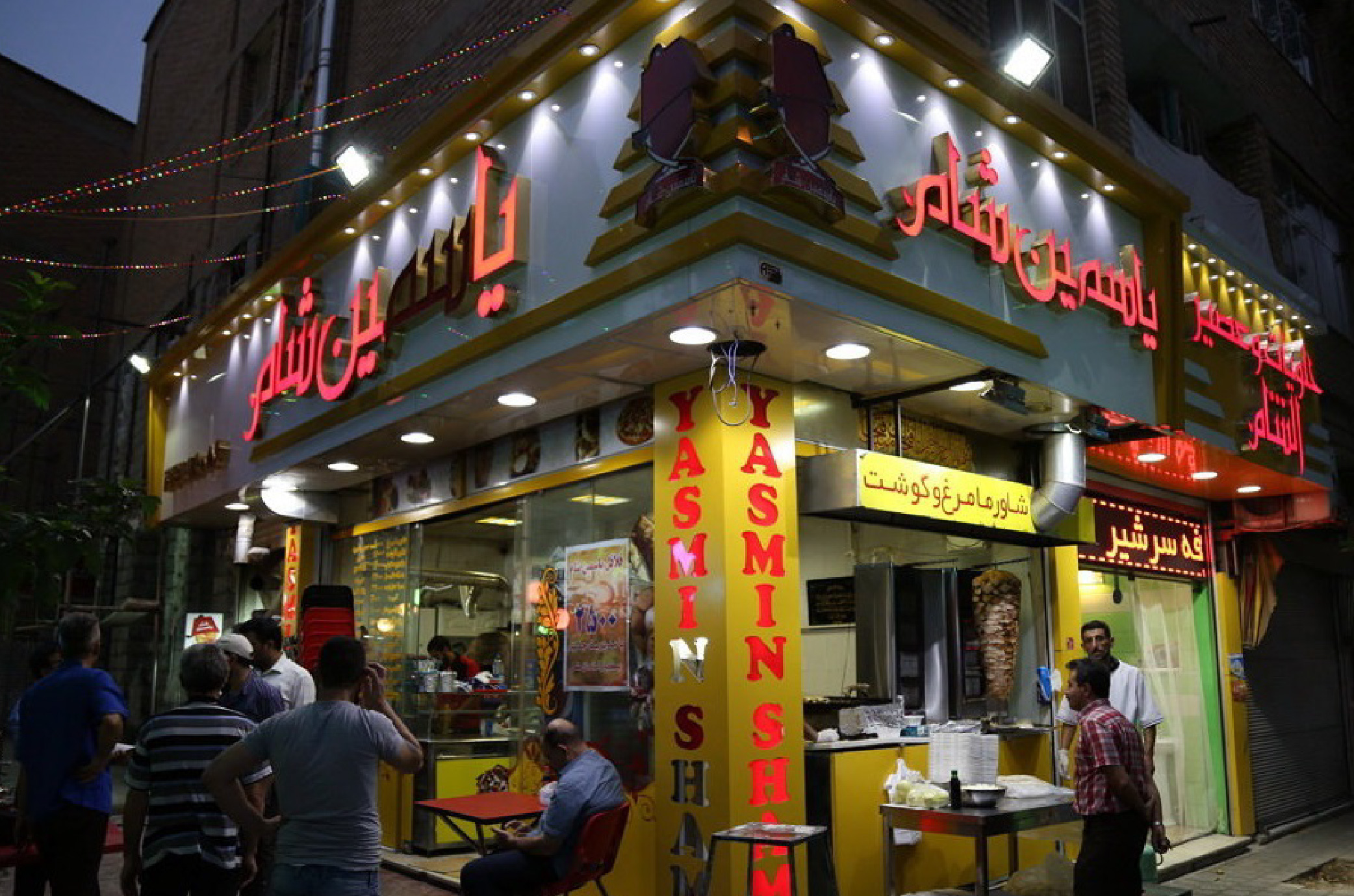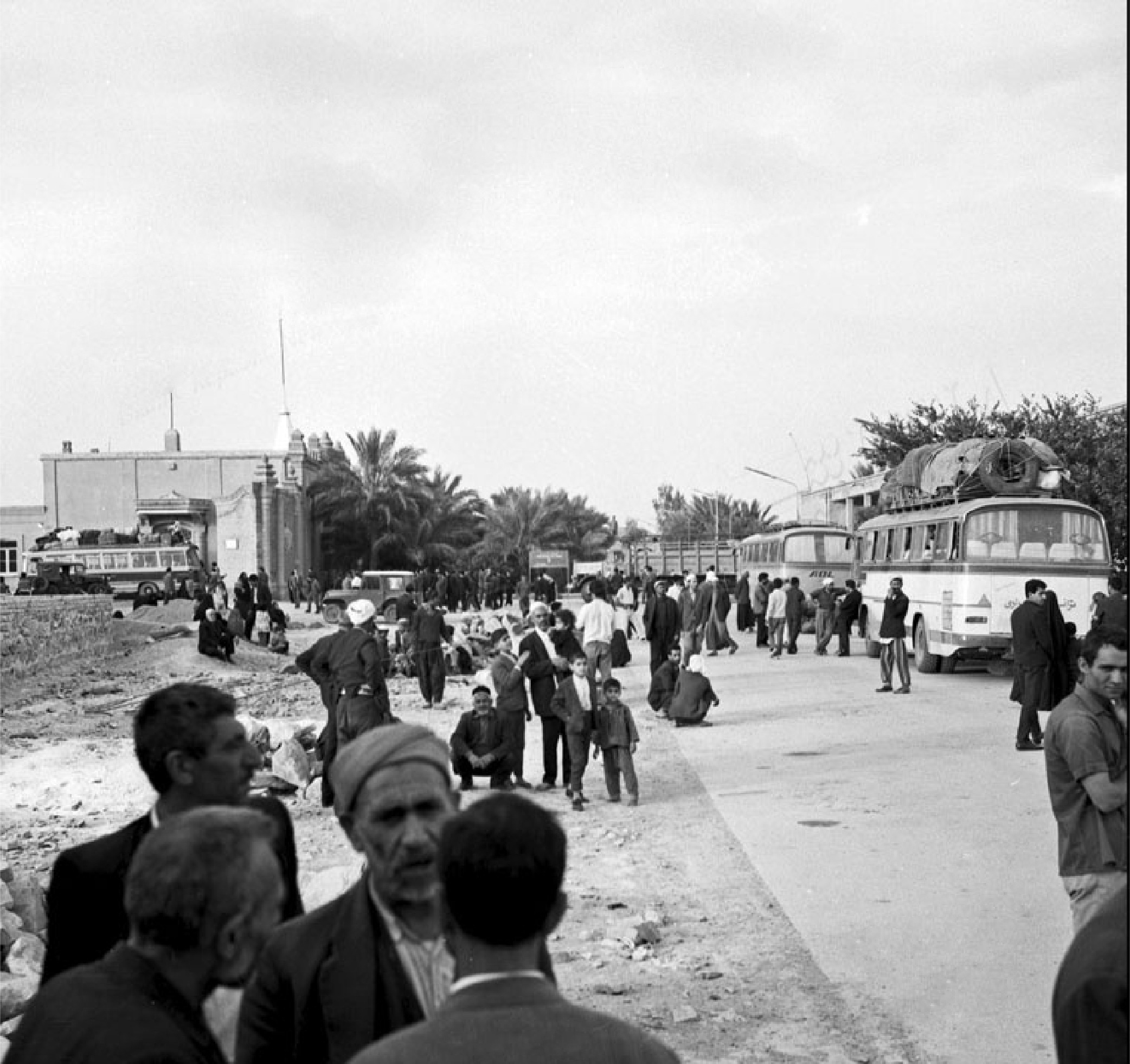As we walk in this neighborhood in the capital, Tehran, it seems as if we are strolling through the streets of Baghdad or the city of Najaf. It's just like Chinatown in the heart of New York in the United States. The stores are Iraqi, the mosques are Iraqi, the signs are Iraqi, the attire is Iraqi, the conversations are Iraqi, and the food is Iraqi. Who brought them here? Wasn't there a war that lasted eight years between Iraq and Iran forty years ago? Many questions haunt those who visit "Dowlatabad" and its Arabian market.
 Arab Iraqi restaurants in Arab neighborhood in the heart of Tehran
Arab Iraqi restaurants in Arab neighborhood in the heart of Tehran
Relations between Iran and Iraq became tense in the 1970s and 1980s, so Iraqi President Ahmed Hassan al-Bakr decided to deport the Iranian Shiites living in Iraq in 1971. This organized government plan was implemented by not extending the residence permits of more than 60,000 Iranians who were living in Baghdad, Najaf, and Karbala, putting pressure on Shah Mohammad Reza Pahlavi due to his position on the ownership of the three islands in the Gulf: Greater and Lesser Tunbs and Abu Musa, which were disputed between Iran and the UAE.
The Iranians call us "Arabs", and when we go to Iraq, they call us "Persians". Navigating between these two lives, these two worlds, Iranian and Iraqi, is difficult and can be uncomfortable at times, and comforting at other times
Tens of thousands of Iranians lived in Iraq during the Ottoman era. Several generations lived and grew up in Iraq without knowing much about their Iranian culture. They learned Arabic and became immersed in Iraqi customs, thus becoming culturally and socially Iraqi, as they describe themselves.
The first journey
Shortly after, the Shah and the monarchy in Iran were overthrown, and the Islamic Revolution prevailed in 1979. This time, under the pretext of an assassination attempt on Tariq Aziz (then Deputy Prime Minister of Iraq), the Iraqi government deported another 40,000 individuals to Iran. Then former President Saddam Hussein seized their properties and left them with nothing, so they found themselves overnight on the Iranian border with nothing. This situation brings back memories of the deportation of Iraqi Jews and the "Farhud" incident that occurred against Jewish families in Baghdad.
Saddam Hussein did not deport some of the young men from these Iranian families, fearing that they would join the Iranian army. Instead, he took them hostage and even killed some of them. The process of expelling Iranians continued until 1984, amidst the escalation of the Iraq-Iran War.
Life in two homelands
Iran welcomed those who became known as the "returnees" and the "expelled." They settled wherever they wanted in major Iranian cities, but most of them settled in the religious cities of Qom and Mashhad and in Ahvaz. In addition, there was the neighborhood of "Dowlatabad" in southeast Tehran, near the shrine of Sayyid Abd al-Azim al-Hasani. It was a newly developed neighborhood in an urban facility, and the government facilitated their settlement there.
 Iranians living in Iraq being forcibly deported back to their homeland Iran
Iranians living in Iraq being forcibly deported back to their homeland Iran
The residents of the capital city of Tehran who refer to the Dowlatabad neighborhood as the "Arab neighborhood" don't know much about their fellow Iranians who still cling to their Iraqi culture. They don't know what these people suffered in terms of identity challenges when they were forced to return to their homeland, nor the tragic scenes they experienced throughout their deportation journey.
"During the Iran-Iraq war, I feared that my identity would be revealed at any moment at school, that my classmates would know that I am Iraqi, and that they're sitting at the same table with their enemy, the state that was bombing their cities on a daily basis. I was both Iranian and Iraqi at the same time, but I didn't know who was right. I was a stranger at school," Fouad Najmeddin recounted to Raseef22 his memories from the 1980s.
Stateless Iranians
Their return of the repatriated individuals to their homeland did not mean the end of their problems; rather, it was just the beginning. Despite nearly 52 years having passed since their first deportation, some of them still suffer from not being able to obtain Iranian citizenship and are treated as foreigners.
In the early decades, the government did not grant Iranian nationalities to repatriated individuals who did not have Iranian documents. But in recent years, citizenship has been granted to those who could prove their Iranian origins, while those who failed to do so had to pay fees to renew their annual residency.
We met Ali, the owner of a date shop in the Dowlatabad neighborhood, and he told us that he obtained citizenship along with his family from the beginning. He went to school, but he didn't speak to anyone because he only knew the Arabic language. He tells Raseef22, "There are some who haven't obtained citizenship. My cousins in Qom city are still living without Iranian nationality, and they face several problems, including high medical costs."
"In elementary school, the principal came to ask me, 'You're Iraqi?' Everyone avoided me, I asked them why, and one said, 'Because your parents killed that girl's father!' He was a war victim, and as an Iraqi who had never seen Iraq, I was accused of murder"
Many of these individuals hold dual nationality, Iraqi and Iranian. After the fall of the Ba'ath regime and the Iraqi invasion in 2003, some of them returned to Iraq, while many, especially those whose children grew up in Iran, remained and created a bridge between their Arab and Persian identities – Iranian and Iraqi. Humans are shaped by their environment. They are an Iranian minority trying to preserve their Iraqi roots.
 Iranians living in Iraq being forcibly deported back to their homeland Iran
Iranians living in Iraq being forcibly deported back to their homeland Iran
This bridge was not only for themselves; as they played a pivotal mediating role between the Persians and the Arabs, and thus were able to contribute – from both sides – in communicating with each other within commercial, social, and even political interactions.
Ali adds, "We, who were born here, have become Iranians. Our lifestyle and behavior are all Iranian. Despite that, Iranians refer to us as 'Arabs', and when we go to Iraq, they call us 'Persians'. Navigating between these two lives, these two worlds – Iranian and Iraqi – is difficult and can be uncomfortable at times, and comforting at other times. I'm satisfied with this approach because when there is a match between the two teams, we support the Iraqi national team at times and the Iranian national team at other times."
As for the Dowlatabad area, in recent years it has become home to some communities from Iraq, Syria, Lebanon, and Bahrain, due to its distinctly Arab atmosphere. And Arabs in this neighborhood don't feel alienated in the heart of the Iranian capital.
"During the Iran-Iraq war, I feared my identity would be revealed at school and my classmates would know they're sitting with their enemy, the state that was bombing their cities. I was both Iranian and Iraqi at the same time, but I didn't know who was right"
Arab restaurants in Tehran
Residents of Tehran flock to the Dowlatabad area to enjoy Arab cuisine. Shawarma, falafel, kebab, fish, knafeh and many other Arab desserts are available 24/7 on Quds Street, creating an atmosphere reminiscent of Baghdad or Damascus, in terms of the restaurants and design.
All the vendors on Quds Street, which crowds with customers in the evening, are Arabs, except for the fruit seller who came from Afghanistan as a refugee. He spoke to us in Arabic and said, "If you don't know the Arabic language, you can't do business here."
 Arab Iraqi restaurants in Arab neighborhood in the heart of Tehran
Arab Iraqi restaurants in Arab neighborhood in the heart of Tehran
The culture of the generations born in Iran has evolved from the culture of their ancestors, but their parents have remained attached to their Arab way of reviving and celebrating religious occasions. The Arab shops in the neighborhood have made them stand out from the rest of the Iranians within Iran.
Iranians bullying Iranian Arabs
These Iranians, who bring together both Arab and Persian cultures, have not been spared from racial prejudice for five full decades. A controversy erupted in 2022 against the traveler Hoda Rostami, who is one of these returnees, due to her tourism project in Iran, which was covered by the Raseef22 website.
The residents of Tehran who refer to the Dowlatabad neighborhood as the "Arab neighborhood" don't know much about their fellow Iranians who still cling to their Iraqi culture, or what these people suffered in terms of identity when they were forcibly returned
The reason for the protest against Hoda's project was the accusation that she was promoting the image of the Islamic Republic system globally by receiving influential people from around the world and touring Iranian cities with them, as they enjoyed more freedoms than the Iranian citizens, especially regarding the hijab. Amid the media defamation of Hoda Rostami, her Iraqi nationality was revealed, and some demanded her expulsion from the country, arguing that she had no right to work in Iran.
Hoda revealed to her followers that her family is Iranian Kurdish and was deported to Iran during Saddam Hussein's era. She was born in Tehran and holds dual nationality: both Iraqi and Iranian. Later, she was granted Swedish citizenship due to her residence there.
 Iranians living in Iraq being forcibly deported back to their homeland Iran
Iranians living in Iraq being forcibly deported back to their homeland Iran
"In the early days of elementary school, the assistant principal entered the classroom and asked me, 'Are you Iraqi?' At that moment, the girls distanced themselves from me. I asked one of them, 'Why are you avoiding me?' She said, 'Because your parents killed the father of that girl!' Her father was one of the war victims, and as an Iraqi who had never seen Iraq in her life, I was accused of murder," Hoda Rostami recounted the bias she suffered from during her childhood. Therefore, she decided to change her school and not reveal that she knew the Arabic language or her Iraqi identity to escape the bullying.
She thought that the hatred and racism would end, but they continued to haunt her even now at the age of 35. At that point, she decided to launch her project to revive tourism in her native homeland, Iran. It appears that her holding on to both her Iraqi and Iranian identities comes at a steep price, one that she has endured and will continue to suffer from for a long time, and she is not alone in this struggle, for there are many others who share her plight.
 A man makes traditional Arab 'Saj' bread In Iran
A man makes traditional Arab 'Saj' bread In Iran
Raseef22 is a not for profit entity. Our focus is on quality journalism. Every contribution to the NasRaseef membership goes directly towards journalism production. We stand independent, not accepting corporate sponsorships, sponsored content or political funding.
Support our mission to keep Raseef22 available to all readers by clicking here!
Interested in writing with us? Check our pitch process here!





